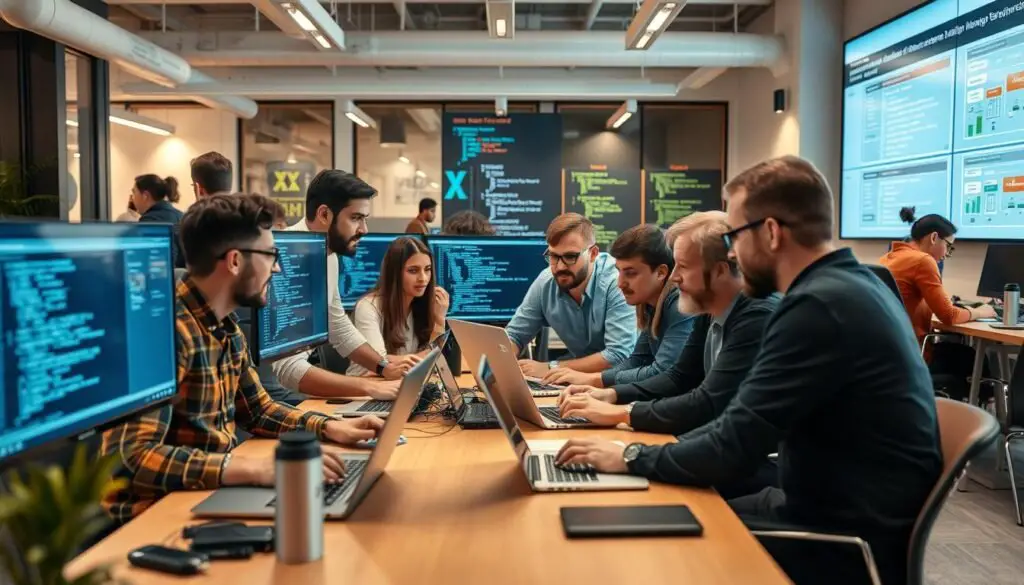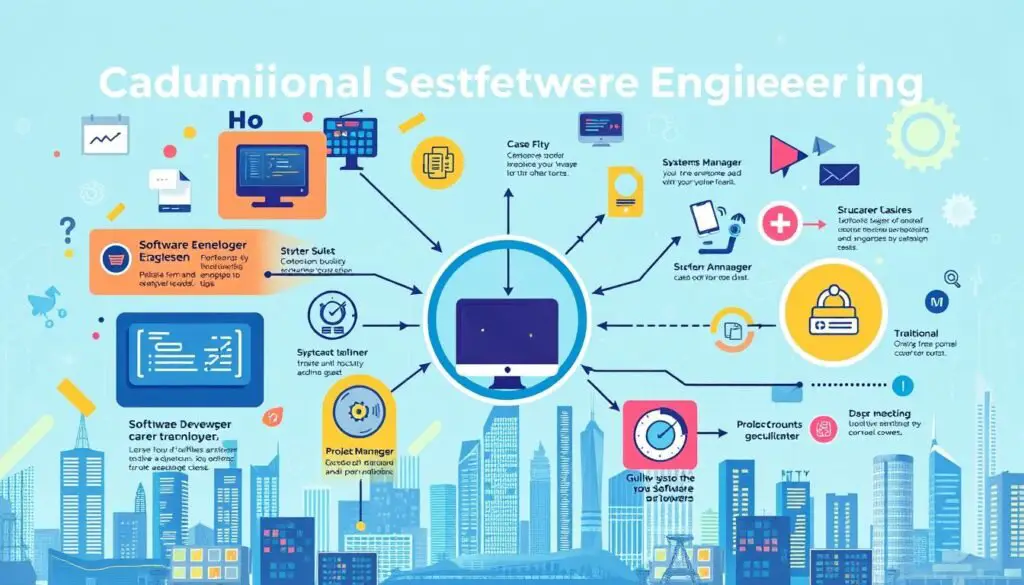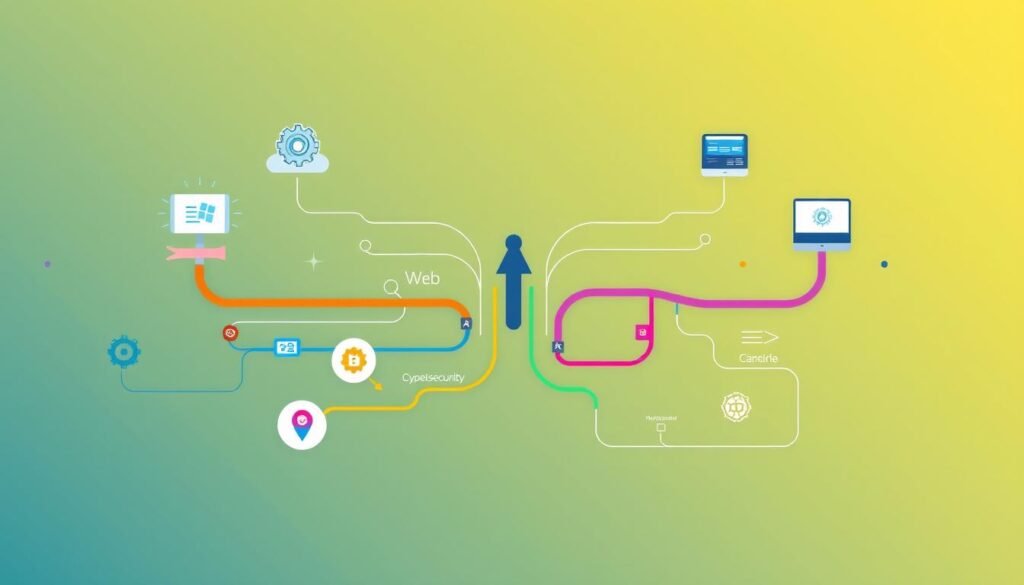Step into the exciting world of software engineering and find your path. This guide explores the changing tech industry. It helps you understand your career journey, whether you’re new or experienced.
It covers the latest trends, needed skills, and many career options. This article is your roadmap to success in software engineering.
Key Takeaways
- Gain a comprehensive understanding of the software engineering field and its various career tracks
- Learn about the latest industry trends and growth projections in the tech industry
- Discover the essential skills required to thrive in modern software engineering roles
- Explore traditional and emerging career paths, from front-end to back-end development and beyond
- Understand the education, certification, and professional development requirements for software engineering success
Understanding the Software Engineering Landscape
The tech industry is always changing, offering many career paths for computer science experts. As more companies need skilled software engineers, it’s key to know the latest trends and skills needed. Also, understanding how software engineering roles have evolved is crucial.
Current Industry Trends and Growth Projections
The field of software engineering is booming, thanks to technology’s growing importance in many sectors. The Bureau of Labor Statistics says software developer jobs will grow 22% by 2029. This growth is driven by the need for more computer software, mobile apps, and web solutions.
Key Skills Required in Modern Software Engineering
- Proficiency in programming languages such as Python, Java, and JavaScript
- Expertise in software development frameworks and tools
- Strong problem-solving and critical-thinking abilities
- Familiarity with Agile methodologies and DevOps practices
- Effective communication and collaboration skills
The Evolution of Software Engineering Roles
Software engineering has changed a lot in recent years. New roles have emerged, and old ones have evolved. Now, there are many tech industry job tracks and computer science career options for professionals to explore.
| Role | Description |
|---|---|
| Front-End Developer | Focuses on the user-facing aspects of web applications, responsible for designing and implementing the visual elements and user interfaces. |
| Back-End Developer | Responsible for the server-side logic and functionality, handling data management, API integration, and the underlying architecture. |
| Full-Stack Engineer | Proficient in both front-end and back-end technologies, capable of working on the entire application stack. |
By understanding the current software engineering landscape, aspiring professionals can better navigate the tech industry job tracks and computer science career options. This helps them find success in this exciting and rewarding field.
Getting Started in Software Engineering
Starting a career in software engineering is exciting and rewarding. It’s great for recent graduates or those moving into tech. Let’s look at the key steps to begin in this field.
Education and Training Options
For aspiring software developers and programmers, a solid education is key. Universities and tech colleges offer programs in computer science and software engineering. These cover data structures, algorithms, and programming languages.
Bootcamps and online courses are also popular for a quicker start. They focus on practical skills and can prepare you for a job faster.
Gaining Practical Experience
- Internships: Look for internships at tech companies to get real-world experience.
- Personal Projects: Work on your own projects, like apps or websites, to show your skills.
- Open-Source Contributions: Join open-source projects on GitHub to prove your technical skills.
Education and practical experience are crucial. They help you stand out in the competitive job market.
“The journey of a thousand miles begins with a single step.” – Lao Tzu
By starting your journey, you’re on the path to a fulfilling career in software engineering.

Traditional Software Developer Career Paths
In the world of software engineering, there are well-established career paths. Three roles stand out: frontend development, backend development, and full-stack engineering. Each offers unique opportunities for engineering career progression and IT career paths.
Frontend Development
Frontend developers create the user-facing parts of software applications. They use HTML, CSS, and JavaScript, along with frameworks like React and Angular. Their work makes the application look good and easy to use.
Backend Development
Backend developers work on the application’s infrastructure. They use technologies like Node.js and Java for data processing and database management. Their work ensures the application runs smoothly.
Full-Stack Engineering
Full-stack engineers know both frontend and backend technologies. They handle everything from designing the interface to the application’s logic and database. They are in high demand for their ability to manage complex projects.
| Career Path | Key Responsibilities | Essential Skills |
|---|---|---|
| Frontend Development |
|
|
| Backend Development |
|
|
| Full-Stack Engineering |
|
|
These traditional career paths are key in software engineering. They offer many opportunities for engineering career progression and IT career paths. Developers can choose the path that fits their skills and goals.

Emerging Specializations in Software Engineering
The tech world is always changing, giving software engineers new paths to explore. With the rise of artificial intelligence, machine learning, the Internet of Things (IoT), and blockchain technology, there are many new areas to dive into. These fields let tech-savvy people grow their coding career advancement and find new tech industry job tracks.
AI/ML engineering has become very popular lately. Companies want to use data to make smart decisions, so they need engineers who can create intelligent algorithms. These experts help make virtual assistants, self-driving cars, and predictive tools work.
The IoT has also brought new job opportunities. Engineers now work on making devices and systems that can talk to each other. They use sensors, communication systems, and cloud platforms to make data exchange smooth in many fields, from smart homes to industrial automation.
- Blockchain engineering is another area that’s getting a lot of attention. It’s about using distributed ledger technology for secure data, cryptocurrency, and apps that work without a central authority.
- Data engineers are also in demand. They build and keep the systems for handling and analyzing data. This is crucial as companies try to find valuable insights from the vast amounts of digital data they have.
As the tech world keeps changing, software engineers who jump into these new areas will have great opportunities. By keeping up with trends and learning new skills, they can make sure their careers stay strong. They’ll help shape the digital world we live in.

Career paths in software engineering: A Comprehensive Overview
Starting your software engineering career opens up many paths. You can move from entry-level to senior roles and even leadership. The field is full of chances for growth and success.
Entry-Level Positions
Beginners often start as Junior Software Engineers or Interns. They learn programming, design, and problem-solving. They work on small projects and learn from more experienced team members.
Mid-Level Opportunities
With more experience, you can become a Senior Software Engineer or Software Architect. These roles mean leading teams, designing big systems, and helping new engineers. You’ll focus on innovation, improving software, and making sure it works well for the future.
Senior Roles and Leadership Positions
At the top, you can become a Lead Software Engineer, Engineering Manager, or CTO. These jobs need deep knowledge, great technical skills, and leadership. You’ll guide projects, manage teams, and work with others to deliver big software solutions.
Choosing any path in software engineering means lots of chances to grow and make a difference. Keep improving your skills, work well with others, and stay current with tech trends. This way, you can have a rewarding and fulfilling career in software engineering.

“The best software engineers are not just coders, but problem-solvers who can see the big picture and drive innovation.” – Jane Doe, VP of Engineering at XYZ Tech
Education and Certification Requirements
Aspiring computer science professionals have many educational paths to choose from. A bachelor’s degree in computer science or a related field is common. But, there are other options that can lead to a successful career in computer science.
Coding bootcamps are becoming more popular. They offer quick, hands-on training in programming languages and software development. This training often leads to job opportunities right after finishing the program.
Getting industry-recognized certifications can also boost a software engineer’s career. Certifications like the Certified Software Development Associate (CSDA) or the Certified Software Development Professional (CSDP) show a candidate’s skills in certain technologies and methods.
| Education Path | Key Advantages |
|---|---|
| Bachelor’s Degree in Computer Science | Comprehensive, in-depth curriculum covering core computer science principles and software engineering practices. |
| Coding Bootcamps | Accelerated, hands-on training focused on job-ready skills and technologies. |
| Industry Certifications | Validate specialized expertise and demonstrate proficiency in specific areas of software development. |
Whether you choose a traditional university degree, a coding bootcamp, or a mix of education and certifications, there are many ways to start your tech career. Aspiring computer science professionals have a wide range of options to explore.
Building Your Technical Expertise
Starting your coding career or looking for new jobs? It’s key to improve your technical skills. Learning the right programming languages and using important tools can open many doors in software engineering.
Programming Languages to Master
The world of programming languages is vast and varied. To move forward in your career, focus on these languages:
- Python: Great for data analysis and web development, it’s easy to learn and use.
- JavaScript: Essential for web development, it helps create interactive web pages.
- Java: Used in big projects and Android apps, it’s strong and scalable.
- C++: Ideal for systems programming and games, it’s fast and efficient.
Essential Development Tools
Knowing the right tools can also boost your career. Here are some key ones to learn:
- Integrated Development Environments (IDEs) like Visual Studio Code to make coding easier.
- Version control systems like Git for teamwork and code management.
- CI/CD platforms like Jenkins for smoother builds and deployments.
- Cloud services like AWS for deploying and growing your apps.
Best Practices and Methodologies
Using industry standards can also help you grow. Here are some practices to try:
- Agile development for teamwork and quick updates.
- Test-Driven Development (TDD) for reliable code.
- Design patterns for scalable software.
- Code documentation for better teamwork.
By learning programming languages, using important tools, and following best practices, you’ll build a strong foundation. This will help you in your career and open up new job opportunities.

Navigating Career Transitions in Tech
The tech world is always changing, offering new chances for software engineers. As you plan your tech career, you might want to try new areas or move up in your field. Moving between roles can be exciting and tough, but with the right steps, you can make smooth changes.
Keeping your skills sharp is key. Learn about new tech, methods, and trends. Improve your skills in areas like programming, data analysis, or project management. This will make you more appealing to employers and help you take on new tasks.
Networking is also crucial. Go to tech events, join online groups, and meet people in your field. These connections can offer advice, mentorship, and job leads. Use your network to learn about the skills needed for your dream job and plan your move.
| Key Strategies for Successful Tech Career Transitions |
|---|
|
When you switch careers, show off your transferable skills. Talk about how your problem-solving, communication, and project management skills fit the new role. Show you’re adaptable and eager to learn, as these traits are prized in tech.
Success in tech career changes needs technical know-how, planning, and a willingness to grow. By facing challenges and seizing opportunities, you can open up new paths for tech career planning and engineering career progression. This will set you up for success in the ever-changing world of software engineering.

Salary Expectations and Growth Potential
Software developer roles are growing fast and are in high demand. It’s important to know about salaries and career growth in this field. The tech industry offers a wide range of salaries and benefits, affecting job satisfaction and financial security.
Entry-Level Compensation
Starting salaries for software developers vary based on location, industry, and experience. In the United States, entry-level salaries range from $60,000 to $85,000 a year. These figures can change based on the role, company size, and the candidate’s skills and education.
Senior-Level Earnings
As developers gain more experience, their salaries can increase a lot. Those with 10+ years of experience can earn between $100,000 and $150,000 or more annually. Senior roles, like lead developer or engineering manager, come with higher pay and more responsibilities.
Benefits and Perks in Tech
- Competitive health and dental insurance plans
- Generous retirement contributions, such as 401(k) matching
- Paid time off, including vacation days, sick leave, and holidays
- Professional development opportunities, such as training and conference attendance
- Flexible work arrangements, including remote work options
- Equity compensation, such as stock options or restricted stock units
- Wellness and lifestyle benefits, like gym memberships or wellness programs
The software engineering field offers great salaries and benefits. It’s a great choice for those looking for financial stability and a good work-life balance.
Remote Work Opportunities in Software Engineering
The tech industry has seen a big change towards remote work lately. Software engineering is leading this shift. For those wanting more flexibility and balance, remote tech industry job tracks and it career paths are great options.
Remote software engineering jobs come with many perks. You can work more efficiently and save time on commutes. Plus, you can do your job from home or any place with good internet.
This shift is even more important now because of the COVID-19 pandemic. It has made remote work more common in many fields.
To do well in remote software engineering, you need to manage your time well. You also need to be good at communicating and staying disciplined. Working well with teams online, using virtual tools, and having a dedicated space are key to success.
Key Advantages of Remote Work in Software Engineering
- Increased flexibility and work-life balance
- Reduced commute time and costs
- Access to a wider pool of job opportunities
- Improved productivity and focus
- Reduced overhead costs for employers
Challenges of Remote Software Engineering
- Effective communication and collaboration
- Maintaining work-life boundaries
- Access to necessary tools and resources
- Potential feelings of isolation or lack of connection
Despite the challenges, the benefits of remote work in software engineering are clear. It’s becoming a popular choice for tech professionals. By adapting to remote work and honing your skills, you can open up new doors in the tech world.

“The future of work is remote, and software engineering is at the forefront of this trend. Embrace the flexibility and opportunities that remote work offers, and you’ll be well on your way to a thriving career in the tech industry.”
Building a Strong Professional Network
In the fast-paced world of software engineering, a strong professional network is crucial. It can open doors to new opportunities and help your career grow. By engaging with the tech community, you can learn about trends and best practices. You can also make valuable connections that lead to great career paths.
Industry Events and Conferences
Going to industry events and conferences is a great way to grow your network. These events let you meet others who share your interests. You can learn from experts and keep up with the latest tech news.
By taking part in discussions and workshops, you can make lasting connections. You’ll become known as a knowledgeable and active member of the software engineering world.
Online Communities and Resources
- Join online forums, discussion groups, and social media platforms focused on coding. These communities are great for sharing ideas, getting advice, and connecting with others who share your goals.
- Use online resources like blogs, podcasts, and webinars to stay current. They offer insights into the latest trends and strategies in software engineering.
Mentorship Opportunities
Finding experienced mentors can change your career. Mentors can offer valuable advice and support. They help you navigate the ups and downs of your career.
Look for mentors in your network or explore formal programs. Find someone who can help you reach your career goals.
“Networking is the single most powerful marketing tactic to grow your business.” – Adrienne Dorison

Building and nurturing your professional network is key to success. It opens up a world of resources and opportunities. Networking keeps you connected, informed, and ready for success in software engineering.
Advancing Your Career Through Specialization
In the fast-paced world of software engineering, focusing on a specific area can change your career path. By becoming an expert in a certain field, you open up many opportunities. You also become a valuable asset in your field.
To move up in your software engineering career roadmap, find what you’re good at and enjoy. Are you great at making user interfaces and interactive experiences? Or do you love working with complex data and API designs?
There are many paths to choose from in software engineering. You can specialize in data science, machine learning, cybersecurity, or DevOps. Each area has its own challenges and rewards. By picking a path that fits your goals, you can become a top expert in your field.
| Specialization | Key Responsibilities | Potential Career Trajectories |
|---|---|---|
| Data Science | Data analysis, predictive modeling, machine learning algorithm development | Data Scientist, Machine Learning Engineer, Business Intelligence Analyst |
| Cybersecurity | Network security, vulnerability assessment, incident response, ethical hacking | Security Analyst, Penetration Tester, Cybersecurity Specialist |
| DevOps | Continuous integration and deployment, infrastructure as code, containerization | DevOps Engineer, Site Reliability Engineer, Cloud Architect |
By choosing to specialize, you can make your software engineering career roadmap shine. This makes you more attractive to employers. It also leads to more challenging and rewarding jobs in the engineering career progression.

“Specialization is the key to unlocking your full potential in software engineering. Embrace your passion, sharpen your skills, and watch your career soar.”
Balancing Technical and Soft Skills
In the world of software engineering, success is more than just knowing code. It’s about finding a balance between technical skills and soft skills. This balance helps software developers shine in their work and in their interactions with others.
Communication in Tech Teams
Good communication is key for any tech team to succeed. It’s about sharing complex ideas, working well with others, and handling tough talks. Skills like listening well, writing clearly, and presenting ideas are crucial for a developer’s career.
Project Management Skills
As developers grow, they take on more roles, like managing projects and leading teams. Skills like planning, allocating resources, and managing risks are essential. These skills show a developer’s ability to lead and manage, boosting their career.
Leadership Development
To reach senior levels, developers need to develop leadership skills. They must inspire teams, make big decisions, and handle many tasks at once. Skills like strategic thinking, solving conflicts, and coaching others are vital for success.
In the fast-changing world of software engineering, combining technical and soft skills is key. By mastering communication, project management, and leadership, developers can open new doors, make a bigger impact, and achieve long-term success.
| Technical Skills | Soft Skills |
|---|---|
| Programming Languages | Communication |
| Algorithms and Data Structures | Problem-Solving |
| Software Design and Architecture | Teamwork and Collaboration |
| Databases and SQL | Time Management |
| Version Control (Git) | Adaptability |
“The most effective software engineers are those who can seamlessly blend their technical abilities with strong interpersonal skills. This combination unlocks new levels of success and career advancement.” – Jane Doe, Engineering Manager
Staying Relevant in a Rapidly Evolving Field
The tech world changes fast, with new tech and trends popping up all the time. To keep up in the tech industry job tracks and computer science career options, software engineers need to keep learning and improving their skills.
One important way to stay ahead is to love learning all your life. Great software engineers always want to know the newest things in their field. They might go to conferences, join online groups, or take extra courses to learn more.
- Attend industry events and conferences to network, learn from experts, and discover emerging trends.
- Engage with online communities, such as forums, blogs, and social media groups, to stay informed and connected with the broader tech community.
- Continuously explore new programming languages, frameworks, and tools to broaden your skill set and adaptability.
Being able to change and adapt is also key. The field of software engineering is always changing, and those who can quickly adjust to new things are very valuable. This means having a mindset that grows, trying new things, and being open to new ways of doing things.
“The only way to keep up with the pace of change in the tech industry is to embrace it and continuously learn and adapt.” – Jane Doe, Senior Software Engineer
By always learning and being flexible, software engineers can make sure they stay relevant and competitive in the fast-changing tech industry job tracks and computer science career options.
Overcoming Common Career Challenges
As a software engineer, you’ll face many challenges. These include keeping up with new tech and managing your workload. It’s key to have strategies to overcome these and keep moving forward in your career.
Keeping up with new programming languages and tools can be tough. The tech world changes fast. To stay sharp, make time for learning. Go to industry events, join online groups, and find mentors to learn from others.
- Allocate time for continuous learning and skill-building
- Leverage online resources, such as tutorials and webinars
- Actively network and connect with professionals in your field
Managing work and personal life is another big challenge. You might work long hours to meet deadlines. It’s important to avoid burnout and take care of yourself. Try different time management methods, set clear limits, and make time for self-care.
“The key to overcoming career challenges is to approach them with a growth mindset. Embrace change, stay curious, and never stop learning.”
Dealing with team dynamics can also be tough. Good communication, teamwork, and conflict solving are vital. Work on your soft skills, learn about office politics, and build good relationships with your team.
By tackling these common challenges, you’ll be ready to grow in your software engineering career.
Conclusion
The world of software engineering is full of exciting opportunities. It ranges from traditional roles like frontend, backend, and full-stack development. It also includes new areas like machine learning, cybersecurity, and DevOps.
If you’re starting or looking to advance in career paths in software engineering, this guide is for you. It covers the skills, education, and paths to a fulfilling career. Stay up-to-date and adaptable to thrive in this fast-changing field.
For a successful software engineering career, keep exploring and pushing yourself. With the right attitude, hard work, and advice, you can achieve your goals. Let your love for technology lead you to a rewarding and meaningful career in software engineering.
FAQ
What are the different career paths in software engineering?
Software engineering has many career paths. You can work in frontend, backend, or full-stack development. There are also specializations like AI/ML, IoT, and blockchain engineering.
What are the key skills required in modern software engineering?
Key skills include knowing programming languages and development tools. You also need to understand software design and agile methodologies. Problem-solving and critical thinking are crucial too.
How do software engineering roles evolve over time?
Roles have changed from simple developers to more advanced positions. Now, you can be a lead developer, technical architect, or engineering manager. These roles come with more responsibilities and strategic decisions.
What are the typical entry-level positions in software engineering?
Entry-level roles include junior developer, associate developer, or software engineer I. These positions help you learn coding, debugging, and project contribution.
What are the educational and certification requirements for a career in software engineering?
You usually need a bachelor’s degree in computer science or related fields. Certifications in programming languages and methodologies can also help your career.
How can software engineers build their technical expertise?
To improve, focus on programming languages and the latest tools. Keep learning best practices and methodologies in software engineering.
What are the typical salary expectations and growth potential in software engineering?
Salaries range from entry-level to senior levels. Growth is based on experience, skills, and specialization. The tech industry also offers great benefits and perks.
What are the benefits and challenges of remote work in software engineering?
Remote work offers flexibility and work-life balance. But, it can be hard to communicate and stay productive from home.
How can software engineers build a strong professional network?
Networking is key. Attend events, join online communities, and seek mentorship. This helps you connect and stay updated on trends and jobs.
What are the common career challenges faced by software engineers, and how can they be overcome?
Challenges include keeping up with tech and managing stress. To overcome these, keep learning, communicate well, and balance work and life.
